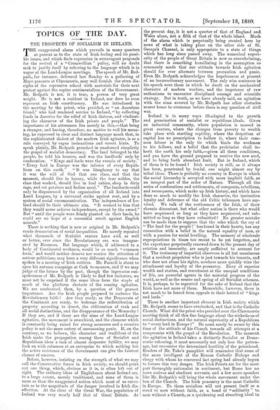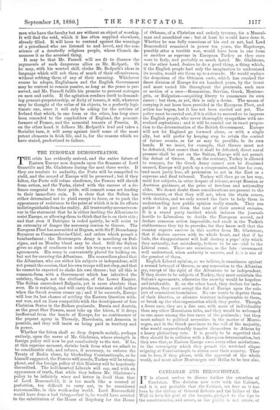TOPICS OF THE DAY.
THE PROSPECTS OF SOCIALISM IN IRELAND.
THE exaggerated alarm which prevails in many quarters at present as to the state of Irish feeling and its possi- ble issues, and which finds expression in extravagant proposals for the revival of a "Cromwellian " policy, will no doubt seek to justify itself by referring to the language which is in vogue at the Land-League meetings. The speech of Mr. Red- path, for instance, delivered last Sunday to a gathering of Mayo peasants at Claremorris, may well furnish the stern dis- ciples of the repressive school with materials for their next protest against the supine sentimentalism of the Government. Mr. Redpath is not, it is true, a person of very great weight. He is not a resident in Ireland, nor does he even
represent an Irish constituency. He was introduced to the meeting by the priest, who presided, as "an American friend," who had rendered service to Ireland, "by collecting funds in America for the relief of Irish distress, and vindicat- ing the character of the Irish priests and people." The importance of his utterances lies merely in this,—that being a stranger, and having, therefore, no motive to veil his mean- ing, he expressed in clear and distinct language much that, in the sophisticated dialect of the modern Irish agitator, is as a rule conveyed by vague insinuations and covert hints. To speak plainly, Mr. Redpath preached in unadorned simplicity the gospel of socialist democracy. The land belonged to the people, he told his hearers, and was the landlords' only by confiscation. "Kings and lords were the vermin of society."
Every lord in Europe was the inferior of every Repub- lican on this earth." "It was blasphemy to say that it was the will of God that one class, and that the meanest, should live in luxury, while the true nobles, the class that worked, should live in foul cabins, sleep in dirty rags, and eat potatoes and Indian meal." The landlords could only be dispossessed by the organisation of all Ireland into Land Leagues, by a universal strike against rent, and by a system of social excommunication. The independence of Ire- land should be their ultimate aim. "It seemed to him that they would never achieve independence, except by the sword." But "until the people were firmly planted on their lands, he could see no hope of a successful revolt against English misrule."
There is nothing that is new or original in Mr. Redpath's crude denunciation of social inequalities. He merely repeated what thousands of Socialist orators have siid, as well or better, ever since the Revolutionary era was inaugur- ated by Rousseau. But language which, if addressed to a body of Continental workmen, would be so much "common form," and would neither deserve nor receive the attention of serious politicians, may have a very different significance when spoken to a meeting of Irish cottiers. Mr. Parnell is about to open his autumn campaign at Cork to-morrow, and if we may judge of the future by the past, though the ingenuous out- spokenness of Mr. Redpath is likely to find few imitators, we must not be surprised if the same ideas form the staple of much of the platform rhetoric of the coming agitation. We are confronted, then, by a question of the gravest importance. Are the Irish people prepared to embrace the Revolutionary faith ? Are they ready, as the Democrats of the Continent are ready, to welcome the redistribution of property according to desert, the obliteration of rank and all social distinctions, and the disappearance of the Monarchy ? If they are, and if these are the aims of the Land-League agitation, the movement is anarchical, and the clamour which is constantly being raised for strong measures and a coercive policy is not the mere outcry of unreasoning panic. If, on the contrary, as we believe, the character and traditions of the Irish make the propagation among them of Socialist and Republican ideas a task of almost desperate futility, we may look on with calmness at an enterprise to which nothing but the active resistance of the Government can give the faintest chance of success.
Before, however, insisting on the strength of what we may call the Conservative forces in Irish society, we should point out one thing, which, obvious as it is, is often left nut of sight. The ordinary ideas of Englishmen about Ireland are, to a large extent, merely traditional, and none of them is more so than the exaggerated notion which most of us enter- tain as to the magnitude of the danger involved in Irish dis- affection. At the close of the Great War, the population of Ireland was very nearly half that of Great Britain. At the present day, it is not a quarter of that of England an Wales alone, not a fifth of that of the whole island. Much.
of the alarm which is perpetually being created here by news of what is taking place on the other side of St. George's Channel, is only appropriate to a state of things. which has long since passed away. The numerical superi- ority of the people of Great Britain is now so overwhelming,. that there is something humiliating in the assumption so commonly made that our attitude towards Irish agitation should for ever alternate between precaution and panic. Even Mr. Redpath acknowledges the hopelessness at present of an insurrectionary movement. The only wise sentences in his speech were those in which he dwelt on the mechanical character of modern warfare, and the impotence of raw enthusiasm to encounter disciplined courage and scientific strategy. But in truth, as we have already said, an agitation with the aims avowed by Mr. Redpath has other obstacles. nearer home to overcome before there is any question of civil. war.
Ireland is in many ways ill-adapted to the growth. and germination of socialist or republican ideals. Given an industrial community, where population is massed in. great centres, where the changes from poverty to wealth take place with startling rapidity, where the despotism of capital has no prescription to hallow it, where their com- mon labour is the only tie which binds the workman to his fellows, and a belief that the proletariat shall in- herit the earth his only faith,—given all these conditions,, and you have the ground prepared to receive the new seed, and to bring forth abundant fruit. But in Ireland, which of them is to be found ? Irish society is still, as it always has been, penetrated by feudal, one might almost say by tribal ideas. There is probably no country in Europe in which the social hierarchy is accepted with more implicit faith, as an integral part of the order of Nature. Through all the' series of confiscations and settlements, of conquests, rebellions, and reconquests, which make up Irish history, and which have done so much to modify the Irish character, the instinctive- loyalty and deference of the old Celtic tribesmen have sur- vived. We talk of the restlessness of the Irish, of their chronic discontent, but what other nation is there who would. have acquiesced so long as they have acquiesced, and sub- mitted so long as they have submitted ? No greater mistake can be made than to suppose that the echo which the cry of "The land for the people!" has found in their hearts, has any connection with a belief in the 'natural equality of men, or with a passion for social levelling. The memory of wholesale expropriations in times too recent to be yet forgotten, and. the experience perpetually renewed down to the present day of eviction and insecurity, are amply aufficient to account for- it. The testimony of impartial observers is all but unanimous that a resident proprietor who is just towards his tenants, and who does not abuse his rights, nowhere more quickly wins the attachment and loyalty of the peasantry. Envy of superior. wealth and station, and resentment at the unequal conditions of life, are powerful agents in the material progress of the world, as well as the source and spring of all Socialist schemes. It is, perhaps, to be regretted for the sake of Ireland that the Irish have not more of them. Meanwhile, however, there is not much to be feared from appeals to their hatred of "kings. and lords."
There is another important element in Irish society which Mr. Redpath seems to have overlooked, and that is the Catholic Church. What did the priest who presided over the Claremorris meeting think of all this fine language about the wickedness of social distinctions, and the natural superiority of a Republican. to "every lord in Europe ?" He must surely be aware by this time of the attitude of his Church towards all attempts at a. compromise with the gospel of the Revolution. The moment the agitation in Ireland takes a distinctly Socialist or Demo- cratic colouring, it must necessarily not only lose the patron- age, but encounter the determined hostility of the priesthood. Readers of Mr. Take's pamphlet will remember that some of the more intelligent of the Roman Catholic Bishops and clergy with whom he conversed last spring had already begun to foresee this very danger. The Irish Priests are for the most part thoroughly nationalist in sentiment, but Rome has no more zealous and obedient servants, and a few more speeches like Mr. Redpath's will bring the whole movement under the, ban of the Church. The Irish peasantry is the most Catholic. in Europe. To them socialism will not present itself as a. creed to men without faith, as a bond of "solidarity " ta, men without a Church, as a quickening and absorbing ideal to men who have the faculty but are without an object of worship. It will find the void, which it has often supplied elsewhere, already filled. It will have to contend against the warnings of a priesthood who are listened to and loved, and the con- science of a devotedly religious people, whose Church de- nounces it as the accursed thing.
It may be that Mr. Parnell will see fit to disavow the arguments of such dangerous allies as Mr. Redpath. Or he may, with his wonted skill, clothe Mr. Redpath's ideas in language which will rob them of much of their offensiveness, without robbing them of any of their meaning. Whichever course he adopts, Englishmen and the English Government may be content to remain passive, so long as the peace is pre- served, and Mr. Parnell fulfils his promise to prevent outrages on men and cattle. If the agitation confines itself to demand- ing peasant-proprietorship, or fixity of tenure, it will, whatever may be thought of the value of its objects, be a perfectly legi- timate one, since it will only be asking for the cottiers of Ireland that which, in one form or the other, has long since been conceded to the copyholders of England, the peasant- farmers of France, and the manorial tenants of Prussia. If, on the other hand, it follows Mr. Redpath's lead and takes a Socialist turn, it will array against itself some of the most potent elements in Irish life, and is, for the reasons which we have stated, predestined to failure.



































 Previous page
Previous page